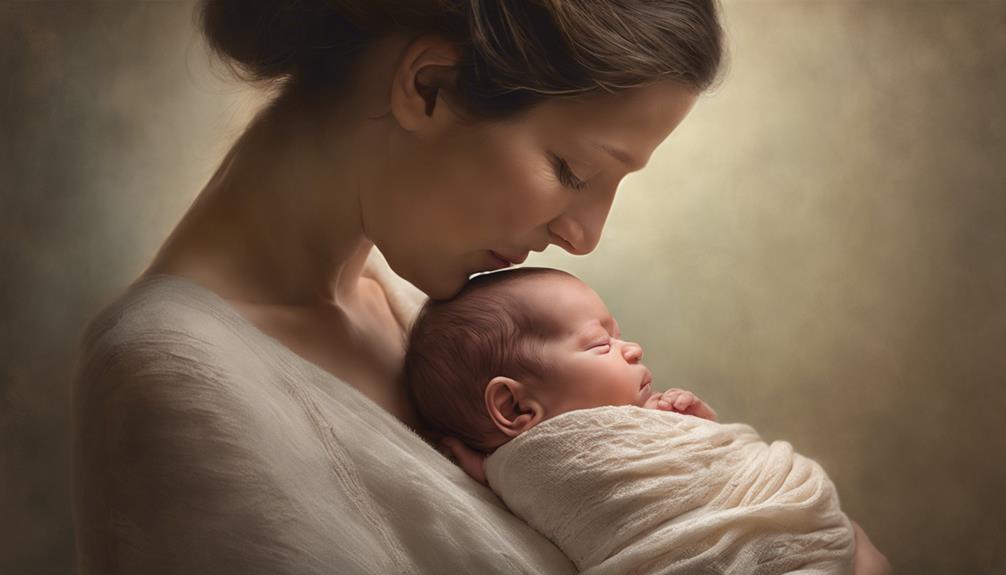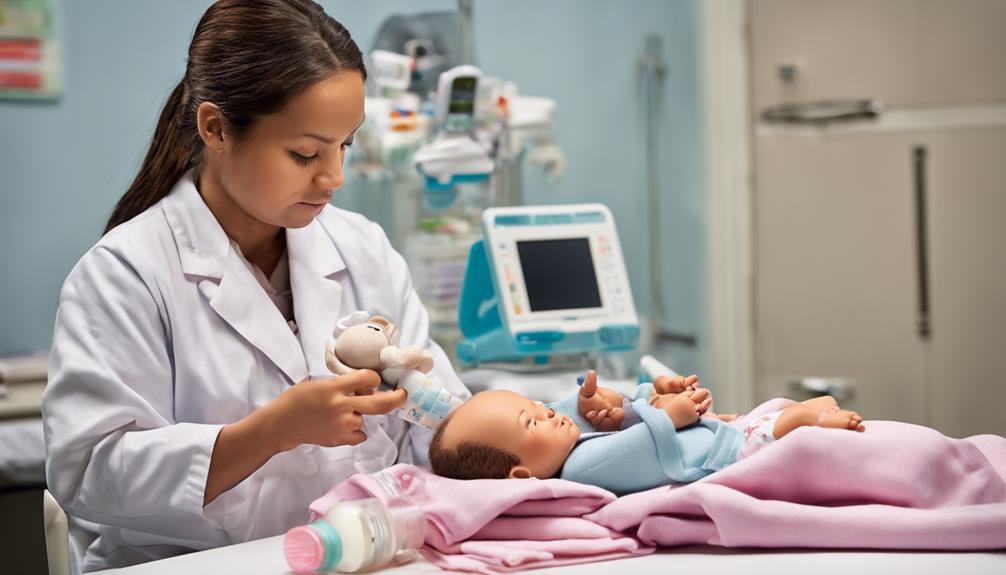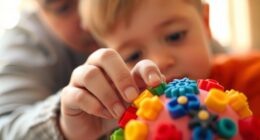When your newborn starts hiccuping, you might wonder what to do to ease their discomfort. Understanding the causes behind these tiny spasms is important, and employing gentle techniques can help bring relief to your little one.
However, there are additional methods and preventive measures that can further assist in managing and preventing hiccups. Knowing when to seek professional advice is also essential.
Stay tuned to learn how you can navigate through these common occurrences with confidence and care.
Key Takeaways
- Pat baby's back or offer a pacifier to relieve hiccups.
- Maintain an upright position after feeding to aid digestion.
- Prioritize frequent burping to prevent and alleviate hiccups.
- Seek medical advice if hiccups persist or cause distress.
Understanding Newborn Hiccups
Developing an understanding of newborn hiccups is pivotal in aiding parents to effectively manage and prevent this common reflex in babies.
Baby hiccups, often seen as a sign of good health and development, are caused by the diaphragm contracting suddenly, leading to the rapid opening and closing of the vocal cords. These little hiccups are frequently experienced by most newborns, especially during feeding or moments of stress.
While they typically resolve on their own within 5-10 minutes, knowing how to stop them or prevent them can provide peace of mind to parents. One way to help alleviate hiccups in babies is by ensuring they burp during and after feeding, which can release trapped air that might be contributing to the hiccups.
If hiccups persist or are causing distress, seeking medical advice is always recommended. Understanding these hiccups can empower you to support your baby through this common yet sometimes worrisome reflex.
Gentle Techniques to Relieve Hiccups

As you seek ways to ease your newborn's hiccups, gentle techniques can offer relief and comfort to your little one. Here are some methods you can try:
- Gently patting or rubbing your baby's back can help release trapped air that may be causing the hiccups.
- Holding your baby upright after feeding can aid in digestion, reducing the likelihood of hiccups.
- Offering a pacifier to encourage a sucking motion can help relax the diaphragm and potentially stop the hiccups.
- Remember to burp your baby during and after feedings to release any gas that could lead to hiccups.
- It's generally safe to allow hiccups to stop naturally within 5 to 10 minutes, as this is a common occurrence in newborns and usually poses no harm.
Soothing Methods for Baby's Comfort
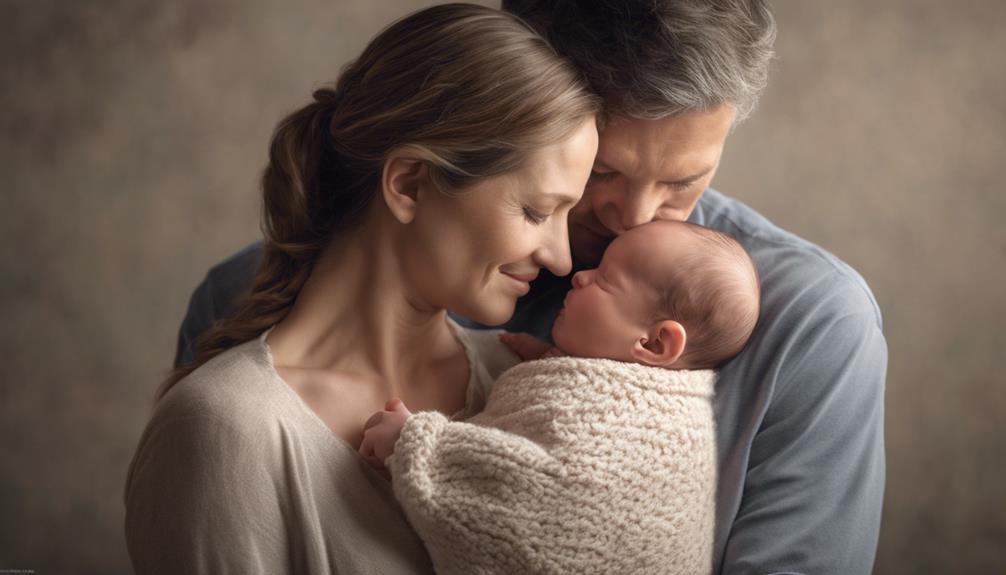
For a soothing experience to comfort your baby, consider employing gentle techniques to alleviate any discomfort from hiccups. If your baby has hiccups, try gently patting or rubbing their back to help release any trapped air causing the hiccups.
Offering your baby small sips of water can also help soothe their diaphragm and stop the hiccups. Remember, it's common and safe to allow hiccups to resolve naturally for 5-10 minutes.
Using a pacifier can relax the diaphragm and potentially aid in stopping the hiccups as well. Additionally, creating a calm and quiet environment during and after feeding can help prevent hiccups in newborns.
Keeping your baby upright for a short time after feeding and encouraging them to burp can further assist in preventing hiccups. Your soothing touch, gentle vocal reassurance, and these helpful methods can help soothe and calm your baby during hiccups.
Tips for Preventing Hiccups in Newborns
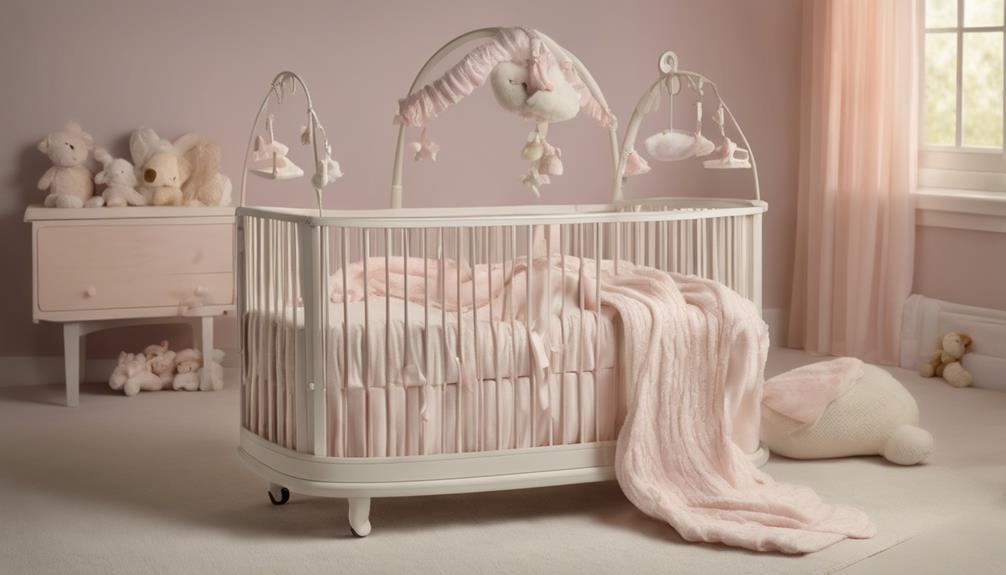
To minimize hiccups in newborns, prioritize frequent burping during feedings to release trapped gas and promote comfort for your baby. Making sure your baby is in an upright feeding position can also help prevent hiccups. Here are some additional tips to prevent hiccups in your little one:
- Use the correct bottle feeding techniques: Opt for a slow-flow nipple and hold the bottle at an angle to prevent your baby from swallowing air.
- Avoid overfeeding: Watch for cues that your baby is full to prevent hiccups caused by a bloated stomach.
- Create a calm environment: Minimize distractions and noise during feedings to help your baby relax and reduce the likelihood of hiccups.
- Check nipple size: Make sure the nipple size is appropriate for your baby's age to prevent them from taking in too much air during feedings.
- Address trapped gas: Gently pat or rub your baby's back after feedings to help release any trapped gas that could lead to hiccups.
Knowing When to Seek Medical Advice
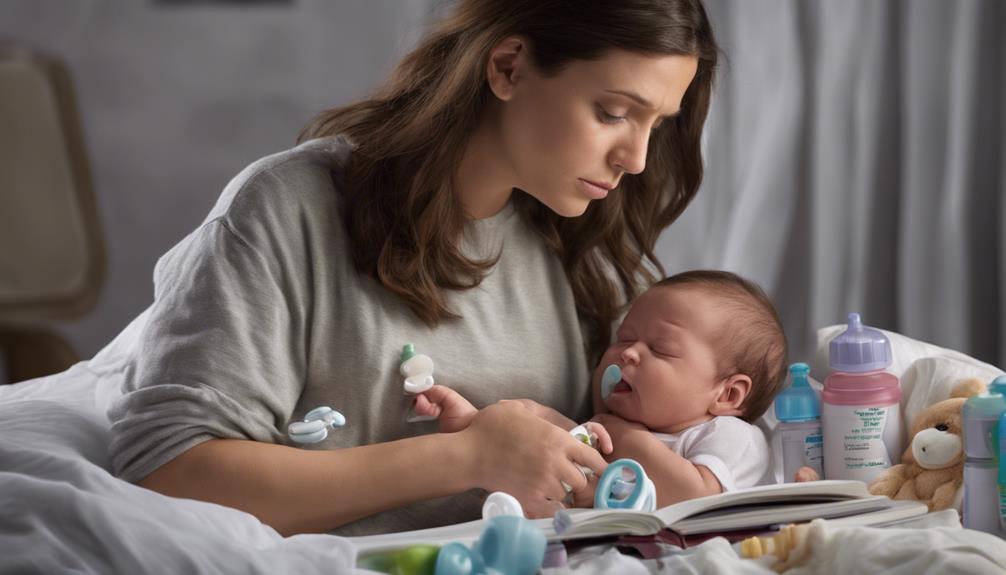
When newborn hiccups persist or cause distress, seeking medical advice is vital to guarantee your baby's well-being. Although newborn hiccups are generally harmless, if they continue for an extended period or are accompanied by other concerning symptoms, consulting a medical professional is recommended. Persistent hiccups could be a sign of gastroesophageal reflux, a condition where stomach contents flow back up into the esophagus, irritating the lining and causing discomfort. If your baby appears uncomfortable, in pain, or unusually distressed due to hiccups, it's important to seek medical help promptly.
While there are various home remedies to help stop hiccups in newborns, it's important to be cautious and seek guidance from a healthcare provider if you're unsure about managing the hiccups effectively. Remember that your baby's well-being is the top priority, and any changes or unusual patterns in their hiccups should be monitored closely. Always trust your instincts and reach out for medical advice whenever needed.
Frequently Asked Questions
What Should I Do to Stop Newborn Hiccups?
To stop newborn hiccups, try burping during and after feedings, offer a pacifier, change positions like holding upright, and gently rub their back. Avoid adult remedies. Remember, soothing techniques like these can help ease your baby's discomfort.
Is It OK to Lay My Newborn Down With Hiccups?
Sure, it's absolutely fine to lay your newborn down with hiccups. Hiccups are common and harmless for babies. They won't cause harm or distress. Just make sure your little one is comfortable, and those hiccups will likely go away on their own.
What Position Is Best for Newborn Hiccups?
To soothe newborn hiccups, hold them against your chest or over your shoulder. Keep them upright to ease pressure on the diaphragm and aid burping. Avoid laying them flat. Experiment with positions to find what works best for your baby.
What to Do if Baby Has Hiccups at Night?
When baby has hiccups at night, try keeping them upright after feeding, patting their back gently, or avoiding overfeeding. Hiccups usually pass on their own. Trust your instinct, parent. You got this!
Conclusion
To wrap up, remember to keep calm and carry on when soothing your baby's hiccups. By following the tips and techniques outlined in this guide, you can help your little one feel more comfortable and at ease.
Remember, it's all about TLC – tender loving care! So don't stress, just keep practicing those gentle methods and your baby will be hiccup-free in no time.



